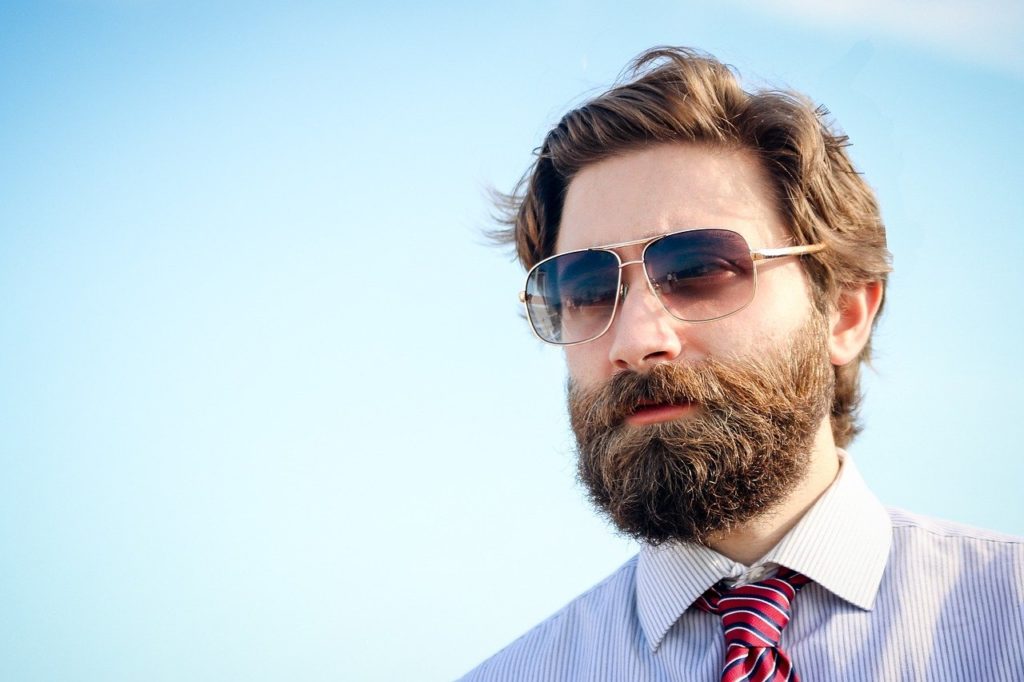Post Content

Growing a beard is a big investment for the man growing it. Your beard requires a lot of maintenance unless you’re going full lumberjack or tackling the Rasputin look. Even if you grow a full beard, you’ll need to learn the various ways of keeping your beard healthy and your skin healthy as well.
This effort changes your daily grooming habits; however, it also affects your perception of yourself. Grooming your beard is an example of self-care, which is linked to improvements in our self-esteem.
Your beard affects your perception of yourself, often making you a more confident person (which in turn makes you more successful). However, there are several ways how your alluring beard affects the people around you that are becoming increasingly well understood due to the research into beard psychology.
Post Content
Increased Masculinity
Beards grow because the skin on our face is affected by the male hormone, testosterone. Men with beards are perceived as being far manlier than their clean-shaven counterparts. The fuller their beard is, the manlier they’re perceived.
Men with beards are considered to be more confident, more mature, and more dominant. The fuller a man’s beard is doesn’t necessarily indicate they have more testosterone, despite that being the perception. However, those factors still correlate with each other, so regardless, a full beard will make people think you’re the manliest of men.
Beards heighten the general traits of manliness, increasing the social perception of these traits. However, this has some negative effects too, as men with beards are seen as less trustworthy, less generous, and less caring than clean-shaven men. While this may have other reasons behind, since beards were often worn by ruling classes over people they ruled, the general perception has stuck. There’s evidence that this trend is changing, especially as beards are becoming increasingly accepted by society.
More Aggressive
Unfortunately, not every perception of beards is a good one. Because beards are associated with increases in testosterone, they’re also associated with increases in aggression. When comparing various facial expressions between clean-shaven and bearded men, those with the man scowls are seen as much more intimidating amongst bearded men.
While there’s no actual correlation between beards and aggressive behaviors, they are seen as such. This is exacerbated with thicker beard growth, so a more full or unruly beard is seen as being much more aggressive.
This makes some sense due to the beard’s association with testosterone. It also lines up with certain historical precedents in human history. The Romans, who were famously clean-shaven, were eventually overthrown by northern barbarians, who instead preferred longer hair and beards. While some of the contexts for that was, in hindsight, racist, the Western perception of conquerors generally include men with beards.
More Maturity

Being able to grow a beard isn’t something a man can do until they’re usually a bit older. However, if you can grow a full beard, regardless of your age, it indicates a general sense of maturity in others. Throughout history, the image of the long-bearded scholar denotes wisdom and intelligence.
This is an idea that goes as far back as Ancient Greece. To the Greeks, beards are considered signs of virility and wisdom, in addition to masculinity. Beards nowadays still denote this aged sense and will make people perceive you as someone who is more self-assured and more competent.
However, the increase in maturity that’s noted nowadays is correlated with bearded men perceived as better fathers and providers. They’re perceived as family men, embodying the desired traits that will help put food on the table and get the kids to bed.
Oddly enough, beards will help men with their careers as they try to get ahead in their careers. Well-groomed beards are seen as helpful when applying for upper or executive-level roles. When looking for entry-level roles, beards are seen as detrimental to your efforts.
Increased Attractiveness
Growing a beard takes a lot of effort to do and maintain. However, it’s widely agreed upon that beards are incredibly attractive features. This can vary in whichever form you wear them, and it includes other facial hair, as well. Different people find different things attractive, and how you wear your beard is largely dependent upon your unique personality. Whether you stick with the full-beard, a shorter beard, stubble, the mountain man look, or maybe just a simple mustache. Generally speaking, though, heavy stubble is considered to be the most attractive way of wearing your facial hair.
The reasons why people find things more attractive is a much more nuanced thing. Different women have different preferences, and not all women find beards attractive. However, it’s entirely likely that the increased attractiveness the comes from men with beards is purely an internal result.
Well-kept beards also stand out and make more dramatic first impressions, which can definitely help someone feel more attractive. Maybe just because beards make men seem much more masculine, they’re also associated with increasing a man’s sex appeal. Especially if the man’s beard is well-groomed, it indicates care in their appearance that shows that they’re comfortable with their masculinity. That, combined with the increased senses of maturity, are very attractive traits for men to have.
Increased Confidence and Self-Perception
The increased attractiveness that comes with beards may be solely a self-fulfilling prophecy. Men with beards are ranked as being more confident in themselves, and as exuding more confidence in themselves. Confidence is itself a hugely attractive thing, and by exuding more confidence, you may be tipping the scales along with this correlation.
Beards affect your perception of yourself, like how people feel more confident when they’re well-dressed in a suit. This may come down to men feeling better about the way they look and looking more confident because of that. However, maintaining a beard falls under the category of self-care, which is linked to increased self-esteem in and of itself. The act of caring for and maintaining a beard instills pride in looking good because of it, and that pride helps men feel more confident, as well.
Regardless of the reason behind it, if men find a look they like and appreciate, it will make them feel more secure with who they are, which also does wonders for their self-esteem.
More Power
Similar to how beards are associated with an increase in aggression, they’re also correlated with having power or being amongst the elite classes. Medieval European kings and other members of the ruling classes wore beards while requiring the peasants to be clean-shaven. In fact, England had a beard tax for many years, forcing men with beards to pay the government just for growing one.
In more recent times, beards have subverted this impression as they were coopted by rebellious counterculture groups, like the Beatniks and Hippies. In those days, beards were used to challenge the existing power and were worn as part of a larger protest movement.
It’s largely unusual to see politicians with beards, at least in the United States, which is thought to be because of this power association. That’s partly because of beard’s association with protest movements, but it’s also thought to have something to have to do with the increased aggressiveness beards signify.
However, as a counter to the possible negative connotations that come with power, beards also command more respect. By looking older or more powerful, they give off a greater sense of self-assuredness that commands respect without outwardly doing anything to demand respect.
Conclusion
The current theory is that beards developed as an evolutionary trait because they signified dominance, masculinity, and aggression. It may be tempting to believe that we retained our facial hair as a holdover from our prehistoric predecessors, whereas in reality, we evolved that trait separately. Most monkeys, and particularly our close cousins, the chimpanzee, and bonobo have hairless faces, likely because they demonstrated men as stronger mates.
However, you choose to wear your beard, keep in mind that it should be a reflection of who you are. Your tastes, preferences, and interests are what make you unique, and your beard is no different from that. Whether you prefer a full beard, goatee, or the clean-shaven look, your facial hair should tell people about yourself and who you are.
Depending on the way your beard is styled, or how it’s worn, your beard will alter the perception others have of you. Knowing the different ways this occurs can help you adjust your appearance to match the impression you’d like to give off into the world.
